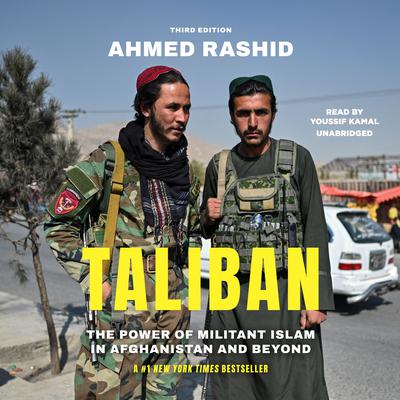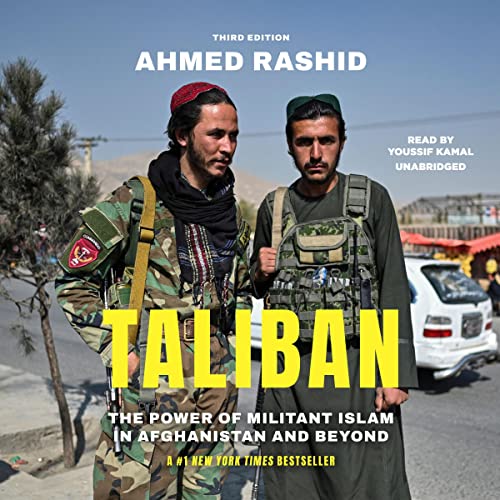Ahmed Rashid’s “Taliban” audiobook provides an in-depth analysis of the Taliban’s rise to power in Afghanistan. It explores the political, social, and religious factors influencing their growth.
“Taliban” by Ahmed Rashid is a comprehensive audiobook that delves into the origins and expansion of the Taliban in Afghanistan. Rashid offers an insightful look into the group’s history, motivations, and the geopolitical landscape that facilitated their rise. The audiobook examines the complex interplay of regional politics, tribal dynamics, and international interventions.
Listeners gain a nuanced understanding of how the Taliban’s ideology evolved and its impact on Afghanistan and global security. This audiobook is essential for anyone seeking to grasp the intricacies of one of the most formidable militant groups in contemporary history.

The Genesis Of The Taliban
The Taliban emerged as a significant force in Afghanistan. Ahmed Rashid’s audiobook, Taliban, explores their origins. Understanding their roots is crucial. This section dives into their early influences and rise to power.
Early Influences
The Taliban’s foundation began in Afghan refugee camps. These camps were in Pakistan during the Soviet-Afghan War. Many young boys were educated in madrassas. These religious schools taught a strict interpretation of Islam.
Influential leaders emerged from these madrassas. Mullah Mohammad Omar was one such leader. He played a pivotal role in shaping the group’s ideology. The Taliban aimed to restore peace and order in Afghanistan. Their early teachings focused on Sharia law and traditional values.
Rise To Power
The Taliban’s rise to power was swift. By 1994, they controlled Kandahar. Their influence spread quickly. They promised security and justice in a war-torn land.
In 1996, the Taliban captured Kabul. This marked a significant turning point. They established the Islamic Emirate of Afghanistan. Their rule was marked by strict laws and harsh punishments. They banned many modern practices and imposed strict dress codes.
Their governance attracted international attention. Some praised their ability to bring order. Others criticized their human rights abuses. The Taliban’s rise was both dramatic and controversial.

Key Themes In Rashid’s Narration
Ahmed Rashid’s audiobook on the Taliban delves deep into complex themes. His narration offers insights into the political and socio-economic landscapes. Here, we explore key themes in Rashid’s narration.
Political Dynamics
The audiobook examines the Taliban’s rise to power. Rashid explains their political strategies and alliances. He discusses the group’s relationships with neighboring countries. The audiobook highlights internal power struggles within the Taliban.
- Political Strategies: Focus on how the Taliban gain control.
- Alliances: Their connections with other nations.
- Internal Struggles: Conflicts among Taliban leaders.
Socio-economic Impacts
Rashid explores the socio-economic effects of Taliban rule. He describes the impact on education and healthcare. The book also touches on changes in local economies. Rashid highlights the role of international aid.
| Aspect | Description |
|---|---|
| Education | Limited access to schools, especially for girls. |
| Healthcare | Decline in medical services and facilities. |
| Local Economies | Disruption of traditional livelihoods. |
| International Aid | Dependence on external help. |
Impact And Relevance Today
The audiobook “Taliban” by Ahmed Rashid provides deep insights into the Taliban’s rise. Understanding this history is crucial for grasping current global dynamics. Rashid’s work remains highly relevant, shedding light on modern conflicts and security issues.
Global Security Implications
The Taliban’s influence extends beyond Afghanistan’s borders. It affects global security in numerous ways. Below are some key points to consider:
- Terrorism: The Taliban’s ties with extremist groups pose a global threat.
- Refugee Crisis: Instability in Afghanistan has led to mass migrations.
- Regional Stability: Neighboring countries face security challenges due to Taliban actions.
| Issue | Impact |
|---|---|
| Terrorism | Increased global terrorist activities |
| Refugee Crisis | Mass migrations affecting various countries |
| Regional Stability | Security challenges for neighboring states |
Lessons For The Future
Rashid’s audiobook offers valuable lessons for future policies. These lessons are critical for governments and organizations. Key takeaways include:
- Engagement: Engage local communities for sustainable solutions.
- Education: Promote education to combat extremist ideologies.
- Collaboration: Foster international cooperation for effective policy-making.
By understanding the Taliban’s history, we can shape better future strategies. This knowledge is essential for global peace and security.

Conclusion
Ahmed Rashid’s “Taliban Audiobook” offers deep insights into the Taliban’s history and influence. It’s a must-listen for anyone interested in understanding this complex group. Enhance your knowledge with this compelling and informative audiobook. Dive into the details and broaden your perspective on global events.



